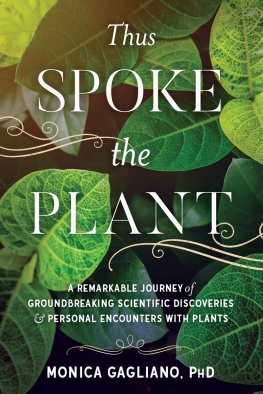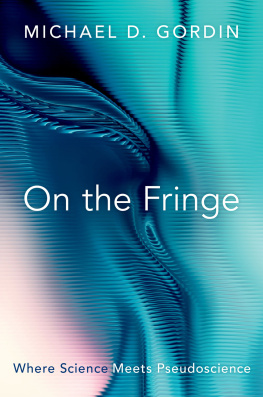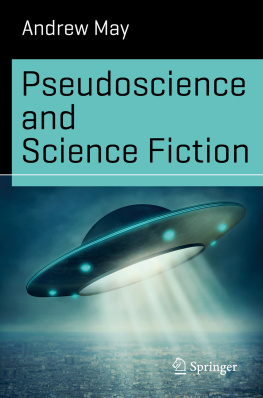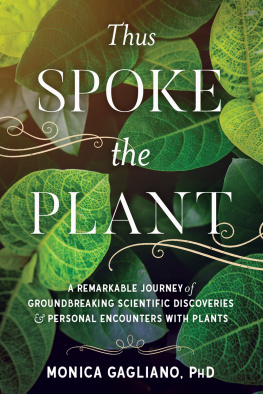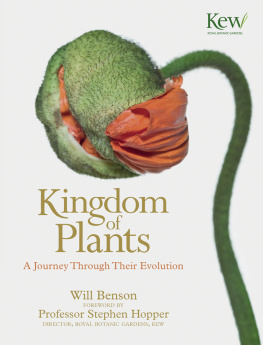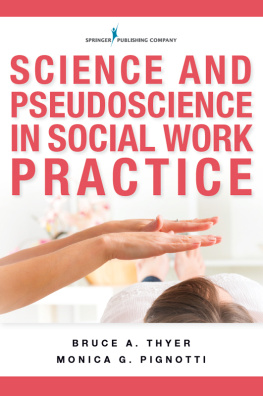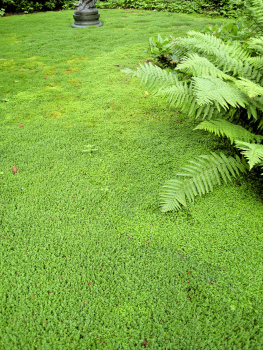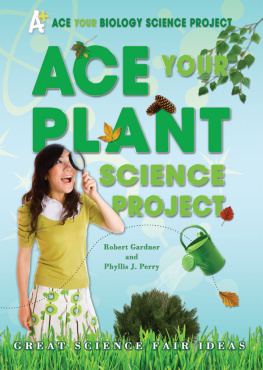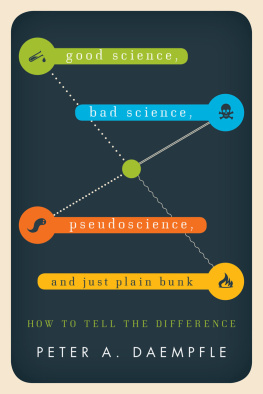
Copyright 2018 by Monica Gagliano. All rights reserved. No portion of this book, except for brief review, may be reproduced, stored in a retrieval system, or transmitted in any form or by any meanselectronic, mechanical, photocopying, recording, or otherwisewithout the written permission of the publisher. For information contact North Atlantic Books.
Published by
North Atlantic Books
Berkeley, California
Cover photo HNK/Shutterstock.com
Cover design by Jasmine Hromjak
Book design by Happenstance Type-O-Rama
Printed in the United States of America
Thus Spoke the Plant: A Remarkable Journey of Groundbreaking Scientific Discoveries and Personal Encounters with Plants is sponsored and published by the Society for the Study of Native Arts and Sciences (dba North Atlantic Books), an educational nonprofit based in Berkeley, California, that collaborates with partners to develop cross-cultural perspectives, nurture holistic views of art, science, the humanities, and healing, and seed personal and global transformation by publishing work on the relationship of body, spirit, and nature.
North Atlantic Books publications are available through most bookstores. For further information, visit our website at www.northatlanticbooks.com or call 800-733-3000.
Library of Congress Cataloging-in-Publication Data
Names: Gagliano, Monica, 1976- author.
Title: Thus spoke the plant : a remarkable journey of groundbreaking
scientific discoveries and personal encounters with plants / Monica
Gagliano.
Description: Berkeley, California : North Atlantic Books, [2018] | Includes
index.
Identifiers: LCCN 2018024075 (print) | LCCN 2018026039 (ebook) | ISBN
9781623172442 (e-book) | ISBN 9781623172435 (paperback)
Subjects: LCSH: Human-plant relationshipsAnecdotes. | PlantsAnecdotes.
Classification: LCC QK46.5.H85 (ebook) | LCC QK46.5.H85 G34 2018 (print) |
DDC 581dc23
LC record available at https://lccn.loc.gov/2018024075
North Atlantic Books is committed to the protection of our environment.
We partner with FSC-certified printers using soy-based inks
and print on recycled paper whenever possible.
To Humanity
The Void sings everything into Being.
You are the Singing Void.
Then Sing!
Keep looking for Truth in the wrong places, and you will never find it. Stop looking there, out there. Find Truth here, where Truth resides.
Foreword
W alk in natureanywhere in the worldand open your senses. Not just one or two of the five, but all of them. The sounds of the lofty tree crowns swaying in the breeze, the sight of deep green that soothes your soul, the smell of soil and bark and the breath of oxygen that rushes into your lungs, the feel of soft leaves as they brush your hands, the taste of sweet fruit on your lips. Monica Gagliano, in Thus Spoke the Plant, asks you to open up to the possibility that plants have some of the same sensesthe ability to hear, see, smell, feel, and tastealong with distinct modalities, new dimensions, to make sense of their world, such as detecting electromagnetic fields, sounds, and low-voltage vibrations. Then check in with your own circle of awarenessyour mind, heart, soul, and body. Not just your five senses, but also your spirit. You have multiple modalities, too, like the plants. And, chances are, they are more aligned than before you stepped outside. Your mind calms, your heart fills, your soul is soothed, and your body feels vibrantly alive. You feel whole, more connected inside, and more attuned to the world. You feel the power to act in your own life and to help craft a more evolved society, one that is connected and attuned to itself and to nature.
Most of us recognize the essential role of plants in our well-being, in the very breath we take. Plants helped create an oxygenated atmosphere, enabling the eventual evolution of humans. The evolution of plants has been so successful that today they account for over 99 percent of the living biomass on Earth. The presence of humans and other animals is dwarfed in comparison. Still, we humans walk through nature not seeing plants as highly evolved creatures, but rather as inanimate, passive, and inferior species. We have constructed a simple vision of plants as lacking in intelligence, agency, or sentience. We have relegated them to the lowest rung of a hierarchy that is headed by humans.
This human construct ignores evolutionary history and has shaped our scientific questions and limited us to finding only certain answers about the meaning of our lives. And from this superiority complex, we have justified the global abuse of plants. And not just of plants, but of any creature we consider inferior to humanswhich means all species. Of course, not all cultures have this anthropocentric superiority complex, but the most dominant and powerful one on Earth today does, and this has created multiple crises on a global scale. Averting socio-ecological disaster now will take a scientific revolution. It will take a deconstruction of our reductionist and parochial approach to understanding life and the invention of whole new ways of understanding the world.
In Thus Spoke the Plant, Monica Gagliano will provide you with a completely different way of understanding and knowing the world. Not just the plant world, but your whole world view. She asks that you tear off your lifetime of cultural blinders and open all of your senses to let in the world of plants. To help you do this, she takes you on her personal journey of confronting her own biases, which started with her changing careers, listening to her dreams, and then acting on her intuition to speak with the plant people that visit her with the guidance of indigenous seers. The plant people call on her to be their voice and guide her to understand their cognitive powers. This personal and professional journey leads her to ask brilliant questions and design simple, elegant experiments that uncover new modalities in plant intelligence. We learn that plants can communicate, are capable of learning, have memory, make decisions, and are cognizant of a greater purpose, in addition to their own Darwinian success, to the communities in which they live.
In Monica Gagliano, plants have chosen the most open, inquisitive, brilliant mind as their spokesperson. With her feet firmly planted in both the scientific method and the wisdom of plants, Monica has tapped into the multidimensionality of nature that will break down forever our suffocating parochialism about our environment. In the face of repeated rejection of her papers by the scientific establishment, she has persisted and published her experiments in the top plant ecology journals. We owe her a debt of gratitude for swimming against the tide and opening up our awareness, even as the rip currents tried to pull her under.
I first met Monica Gagliano in 2016 at a think tank on plant communication hosted by the Bill and Melinda Gates Foundation in Seattle. About thirty leading scientists in the field of plant communication had gathered together to discuss how their discoveries could inform sustainable agricultural around the world. Monicas youth, in particular, masked a wisdom and body of work that most scientists never attain. I had just shown my work on mycorrhizal fungal networks that link mother trees with the myriad other trees and plants in the forest and how the Aboriginal people of North America have long known of their importance to forest health. Many brilliant presentations followed, but what I remember most was Monica standing up for proper attribution of companion-plant communities to the first peoples of the Americas, rather than to new industrial scientific patents. Monica, having journeyed deeply with them, was standing up for the native plants and the people.
Next page
